Unlock Your Genetic Potential
Test at Labs Across Thailand or Nurse Assisted Lab Draw at On-Demand Location
Health Risk Assessment, Ancestry Insights, Customized Wellness Planning and Fascinating Traits Analysis
✅ Secure and Confidential Screening
✅ Personalized Health Insights with Afflictions
✅ Self- or Nurse-Assisted Specimen Collection
✅ Test at Home for an additional 750 THB Only
Walk-in is Welcome at MedEx, Sukhumvit 13, Bangkok
Open Daily 8am-7pm. 2 Minutes Walk from BTS Nana, BTS Asoke and MRT Sukhumvit.

Ancestry Insights
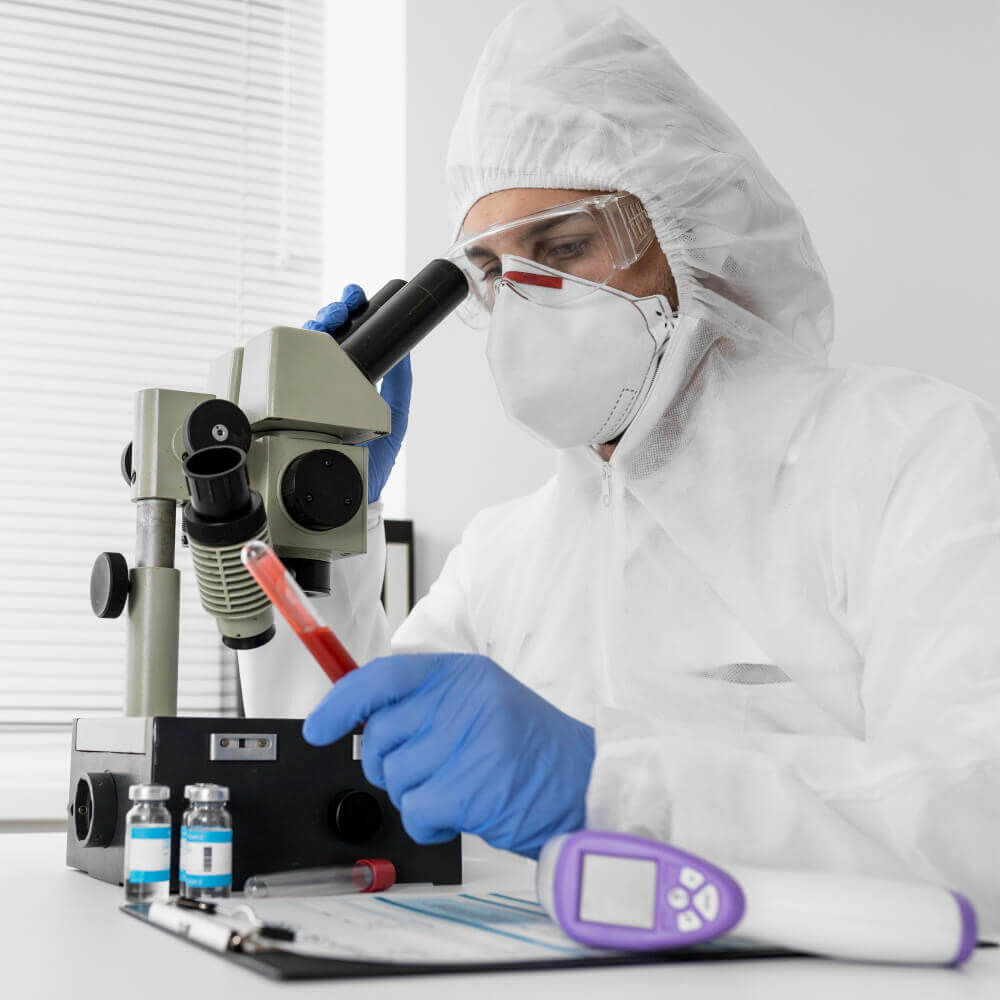
Health Risk Assessment
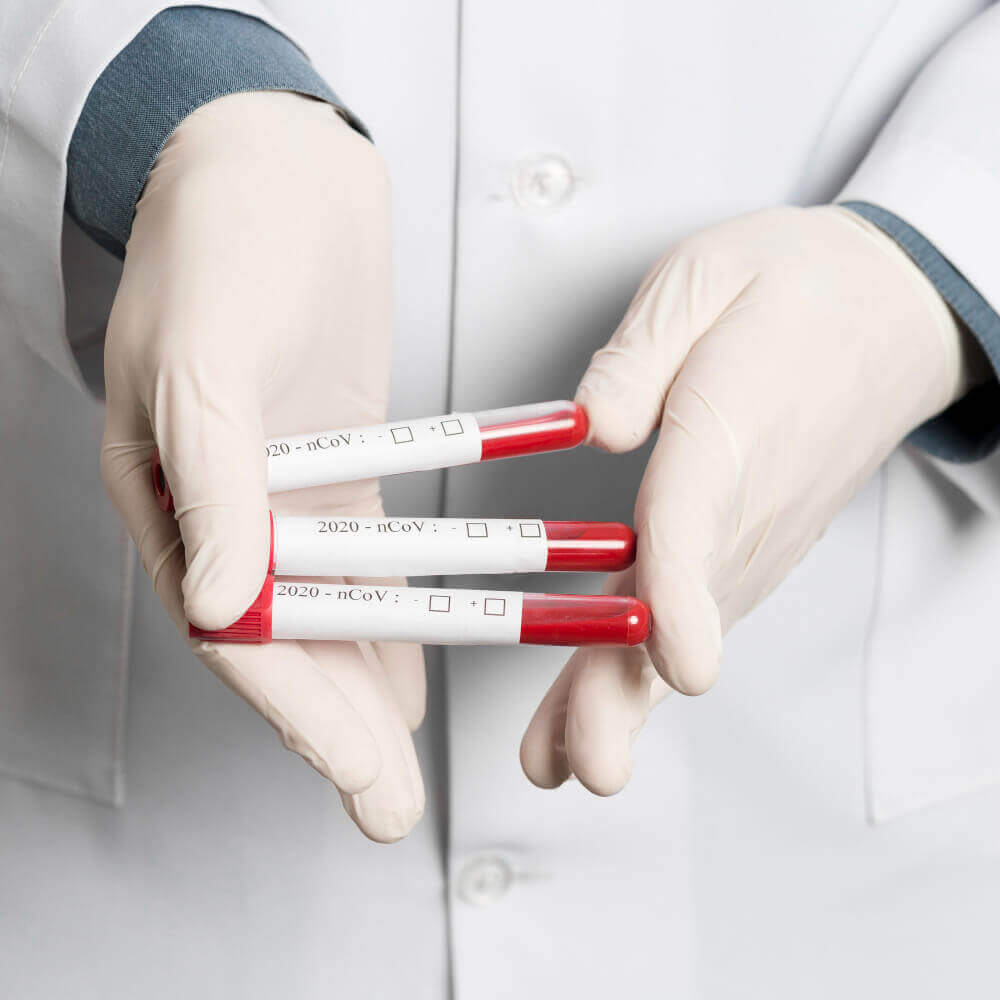
Customized Wellness Plans

Fascinating Trait Analysis
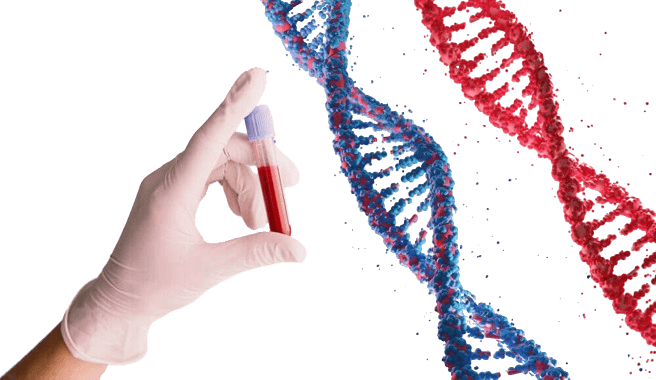
Explore Your Genetic Heritage
Discover your ancestral roots and trace your family's journey through generations. Our comprehensive DNA analysis will reveal the regions your ancestors called home, giving you a deeper connection to your past.
- Optimize Your Health
- Uncover Your Genetic Traits
- Discover Your Unique DNA Insights
- Confidential & Secure Testing
Minimal style with icon & button
Explore your design idea with this simple but eye-catchy minimal style with icon and button.
Easy Payment
A small river named Duden flows by their place and supplies it with the necessary regelialia. It is a paradise
User Review
A small river named Duden flows by their place and supplies it with the necessary regelialia. It is a paradise
Communication
A small river named Duden flows by their place and supplies it with the necessary regelialia. It is a paradise
Choose Your Ideal Solution
Tailoring Your Choice Based on Your Needs

Non-Invasive Prenatal Testing NIFTY
-
Available packages
- NIFTY Pro
- NIFTY Core
- NIFTY Focus
- NIFTY Twin

VISTA Carrier Screening
-
Available packages
- Carrier screening
- Thalassemia-Seq
- PGT-A
- Paternity test

SENTIS Hereditary Cancer Screening
-
Available packages
- Hereditary Cancer
- Cancer + discovery
- SENTIS Lung
- COLOTECT

Infectious Products
-
Available packages
- COVID-19 testing
- Monkeypox Virus
- PM solution
- HPV DNA test
How It Works
A Step-by-Step Guide to Understanding the Process
-
Book Your Test Convenient Scheduling
-
1) Book Your Test Convenient Scheduling
-
Collect Your Sample Easy Sample Collection
-
2) Collect Your Sample Easy Sample Collection
-
Samples Processed Accurate Laboratory Testing
-
3) Test Your Sample Accurate Laboratory Testing
-
Online Results Promptly by Email
-
4) Online Results Promptly by Email
Understanding
Types of Genetic Testing
-
NIFTY
-
VISTA
-
NOVA
-
BGI Xome
-
SENTIS Hereditary Cancer Screening
-
COLOTECT
-
DNALL
-
Telomere Length Test
-
Paternity test
VISTA Carrier Screening
Carrier screening for Monogenic disease
- Target customer: couples who are planning for pregnancy, during pregnancy before GA 14 weeks
- Package: Mini panel - 12 โรค Targeted panel 2.0 - 173 โรค
- Specimen: blood 5 ml EDTA tube
- TAT: 21 working days
- Method: NGS (Target region capture)
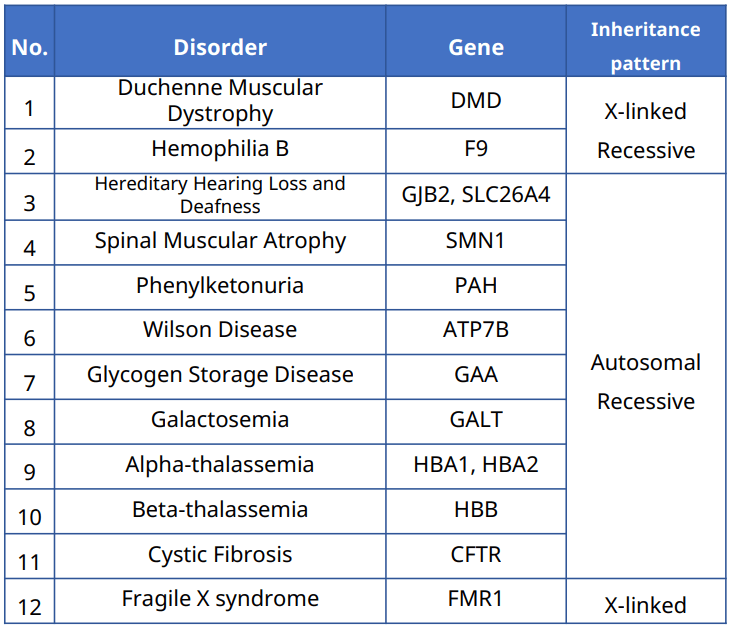
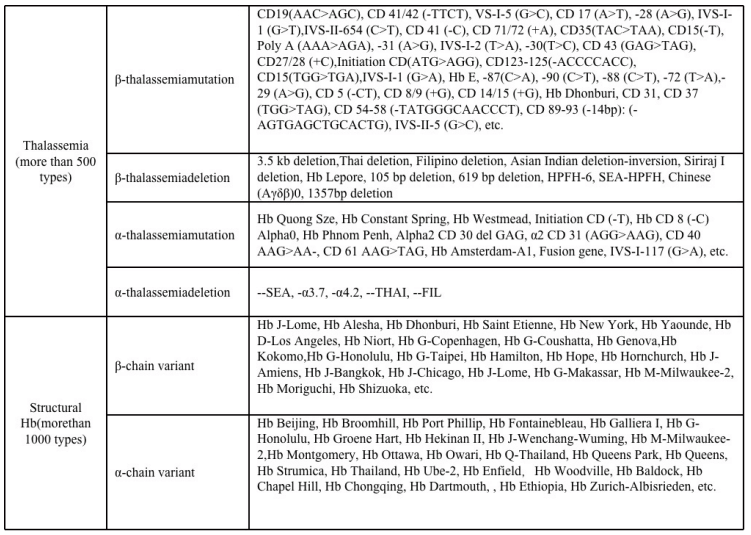
VISTA Thalassemia-Seq
Thalassemia mutations detection for > 508
Thalassemia mutation including common
Alpha- and Beta-thalassemia
- Target customer: couples who are planning for pregnancy, during pregnancy before GA 14 weeks, normal population
- Specimen: blood 3 ml EDTA tube
- TAT: 21 working days
- Method: NGS (Target region capture)
NOVA Newborn Genetic Testing
Newborn genetic screening for 112 genetic
diseases
- Target customer: newborn to age 5 years
- Specimen: Dried blood spot, cord blood, Oral swab
- TAT: 20 working days
- Method: NGS (Target Region Capture)
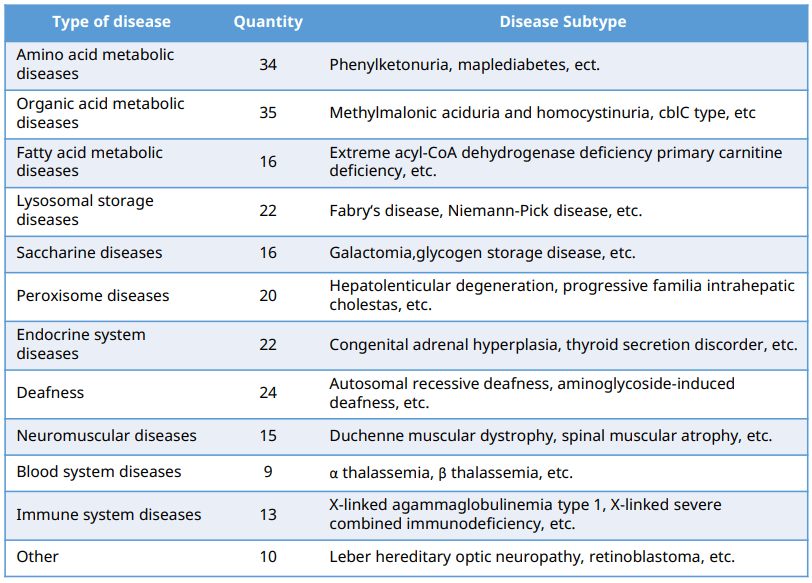
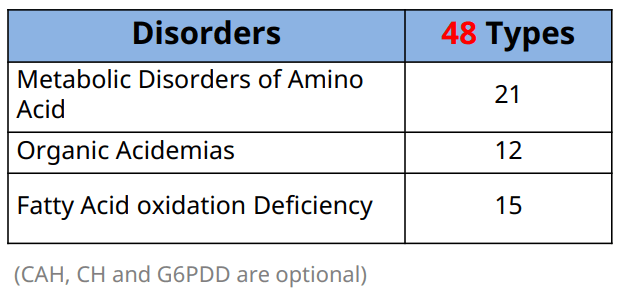
NOVA Newborn Metabolic Screening
Newborn metabolic disorders screening
- Target customers: newborn from age 3 days to 7 days
- Package: 48 metabolic disorders 51 metabolic disorders
- Specimen: Dried blood spot
- TAT: 5 working days
- Method: Mass Spectrometry
BGI Xome
Clinical whole exome sequencing for detection
and diagnosis of rare diseases
- Target customer: Patients with rare diseases that have not been diagnosed
- Package: Clinical Whole Exome Sequencing, WES express, Genetic Testing for Monogenic Disease
- Specimen: blood 3 ml EDTA tube
- TAT: 26 working days
- Method: NGS (Target region capture)
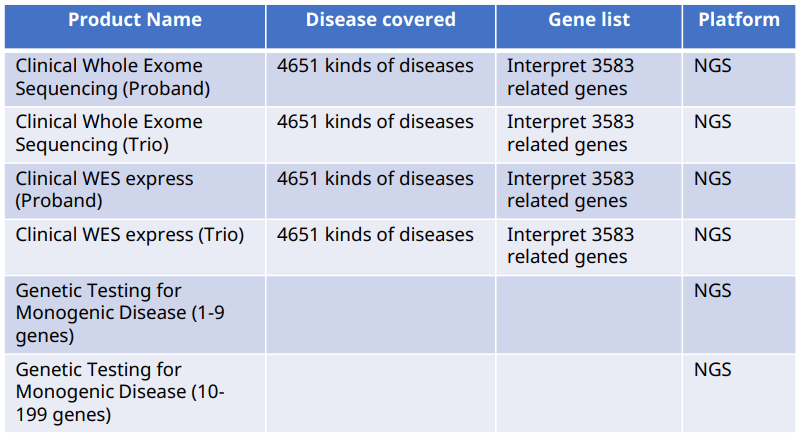
SENTIS Hereditary Cancer Screening
Detection of gene mutations that result in a
higher-than-normal chance of developing
cancer which can help predict the risk of
cancer.
- Target customer: pregnant women GA 10 – 24 weeks
- Package: NIFTY pro, NIFTY core, NIFTY focus, NIFTY twin
- Specimen: blood 10 ml Streck tube
- TAT: 5-7 working days
- Method: NGS (low-pass WGS)
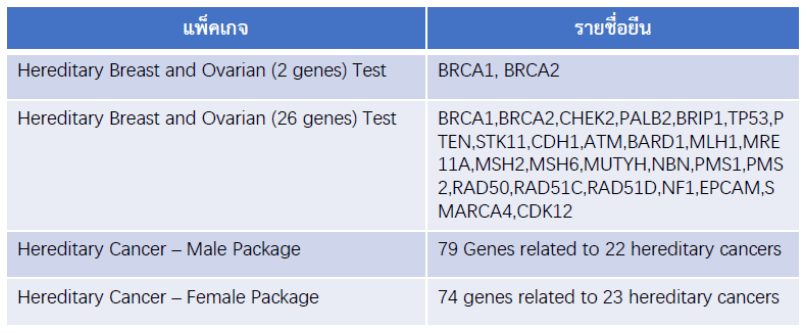
COLOTECT
Non-invasive early screening of colorectal
cancer by detecting 3 Methylation marker
genes
- Target customer: pregnant women GA 10 – 24 weeks
- Package: NIFTY pro, NIFTY core, NIFTY focus, NIFTY twin
- Specimen: blood 10 ml Streck tube
- TAT: 5-7 working days
- Method: NGS (low-pass WGS)
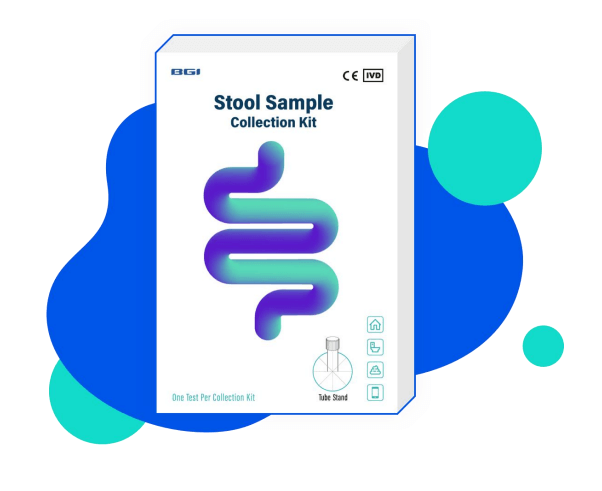
DNALL
Examining the genetic code to analyze individual characteristics lifestyle, design balancing food and nutrition including the exercise that is most appropriate for you. It can also predict the risk of diseases that will be caused by genetic factors to be used as information to reduce the risk of disease in the future.
- Target customer: normal person, newborn
- Package: Prestige 900+ reports SNIP & PICK 700+ reports
- Specimen: Oral swab
- TAT: 15 - 21 working days, 30 – 35 working days
- Method: NGS (30X WGS), Microarray
- Report: Web based
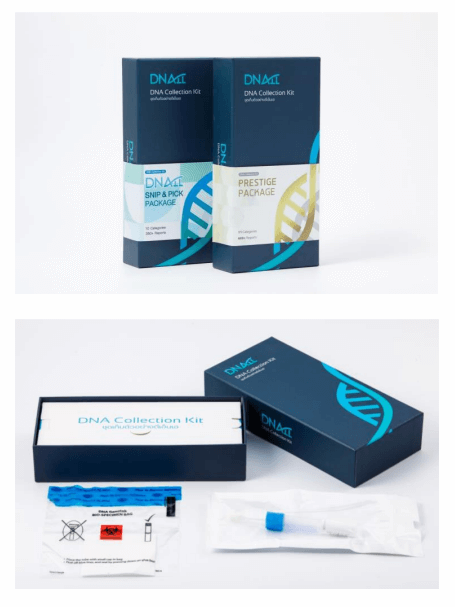
Telomere Length Test
Measurement of telomere length to determine
your true biological age
- Target customer: normal person, newborn
- Package: Prestige 900+ reports SNIP & PICK 700+ reports
- Specimen: Oral swab
- TAT: 15 - 21 working days, 30 – 35 working days
- Method: NGS (30X WGS), Microarray
- Report: Web based
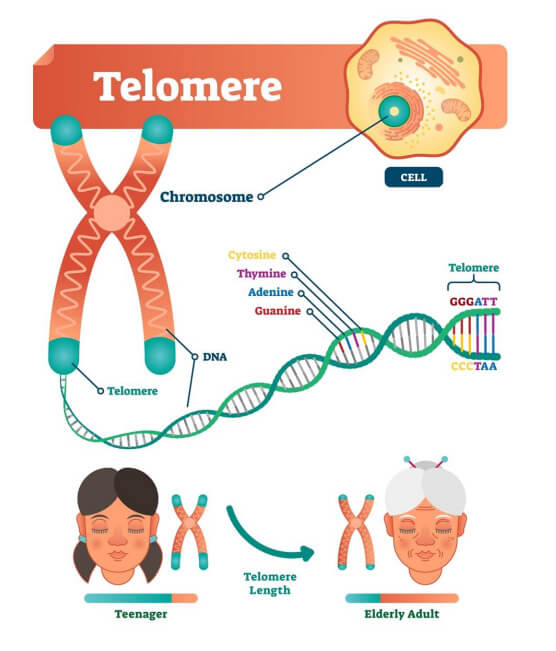
Non-Invasive Prenatal Paternity Test (NIPPT)
Confirm the paternity of your unborn baby with a 99.9% accurate test that requires only blood samples from the mother and alleged father
- Target customer: pregnant women GA 10 – 24 weeks
- Package: NIFTY pro, NIFTY core, NIFTY focus, NIFTY twin
- Specimen: blood 10 ml Streck tube
- TAT: 5-7 working days
- Method: NGS (low-pass WGS)
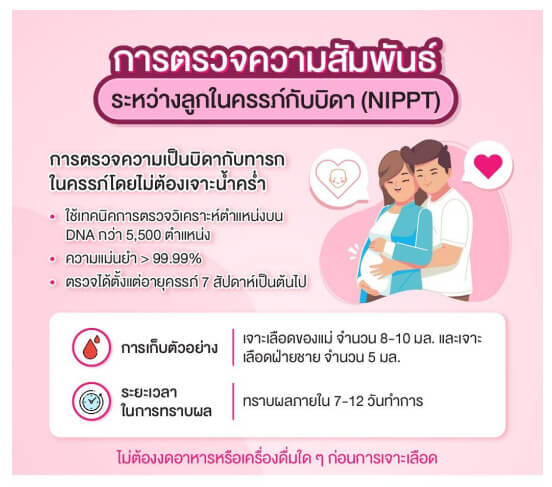
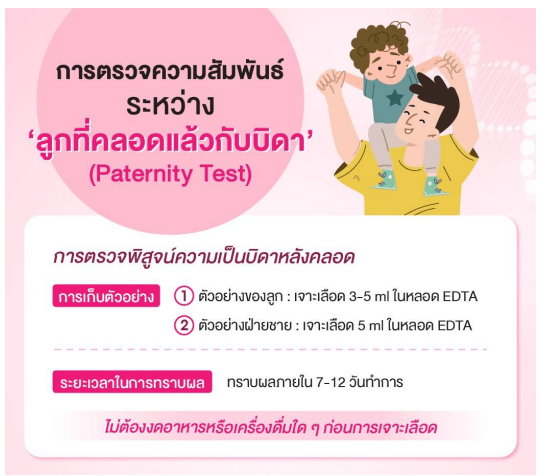
Paternity test
A Paternity DNA Test is used to determine who is the genetic Father of a Child or Children
- Specimen:
- maternal blood 3-5 ml EDTA tube
- 5 nails
- 5 hairs with hair root
- Buccal swab
- TAT: 7-12 working days
Unlocking the Secrets of Your DNA
Explore Your Ancestry, Optimize Your Health, and Embrace Your Unique Genetic Traits with Our Comprehensive DNA Testing Service
Unlocking the Secrets of Your DNA
This is a medical test that couples or individuals planning to have a baby can undergo before conception. It is designed to identify potential genetic disorders in the baby's DNA. The primary goal is to provide reliable and early information about the fetal genetic health without resorting to invasive procedures that might carry the risk of miscarriage. This test helps parents make informed decisions about their pregnancy and prepares them for any potential health challenges their child may face.
SENTIS Hereditary Cancer Screening is a specialized DNA test that focuses on detecting genetic mutations associated with hereditary or familial cancers. This test helps individuals understand their genetic predisposition to certain types of cancer. By analyzing an individual's genetic blueprint, SENTIS aims to provide early insights into the risk of developing hereditary cancers. Armed with this knowledge, individuals can take proactive measures for cancer prevention and early detection, potentially saving lives.
Hereditary DNA testing is a comprehensive examination of an individual's genetic makeup. By analyzing an individual's DNA, this test offers insights into one's unique genetic blueprint. It can reveal information about ancestry, traits, and potential health risks, including genetic predispositions to various conditions. This test empowers individuals to gain a deeper understanding of themselves on a genetic level, which can be valuable for making informed decisions about their lifestyle, health, and wellness.
Genetic testing is a broad category of medical and scientific examinations that involve analyzing an individual's DNA. These tests can reveal information about an individual's genetic makeup, including their susceptibility to certain diseases, ancestry, and genetic traits. Genetic testing has applications in various fields, such as medicine, ancestry research, and personalized healthcare. It helps individuals and healthcare providers make informed decisions regarding health, family planning, and overall well-being.
FAQs
Frequently Asked Questions
Genetic disorders arise due to alterations in an individual's genetic material, encompassing their genes and chromosomes. Aneuploidy characterizes a condition where there are either surplus or deficient chromosomes. Trisomy denotes the presence of an extra chromosome, while monosomy signifies the absence of one chromosome. Inherited disorders, conversely, result from genetic changes termed mutations. These disorders comprise conditions like sickle cell disease, cystic fibrosis, Tay-Sachs disease, and numerous others. Typically, for an offspring to be affected by an inherited disorder, both parents must carry the same mutated gene.
Prenatal genetic testing is a medical examination performed during pregnancy to assess the genetic health and development of the fetus. It aims to identify potential genetic abnormalities, chromosomal disorders, or inherited conditions in the unborn child. Prenatal genetic testing offers valuable information to expectant parents and healthcare providers, aiding in making informed decisions about the pregnancy, including choices about the continuation of the pregnancy, preparing for medical interventions, or planning for the care of a child with special needs.
1. Screening Tests: Prenatal screening tests are typically the first step in assessing the risk of a fetus having a genetic disorder. These tests are non-invasive and include options like non-invasive prenatal testing (NIPT), maternal serum screening (also known as triple or quad screen), and ultrasound examinations. They provide information about the likelihood of the fetus having certain genetic conditions. If a screening test suggests an increased risk, further diagnostic testing may be recommended.
2. Diagnostic Tests: Prenatal diagnostic tests are more invasive and definitive. They are performed when a screening test indicates a higher risk of a genetic disorder or when there are other indications for a diagnostic assessment. Common diagnostic tests include chorionic villus sampling (CVS) and amniocentesis. These tests directly examine the genetic material of the fetus, providing a definitive diagnosis of genetic conditions, chromosomal abnormalities, or other genetic disorders.
Discover Your Genetic Story
Embark on a unique journey of self-discovery with our DNA testing services. Uncover your ancestral origins, gain insights into your health, and explore the fascinating world of your genetic traits. Your DNA holds the key to your past, present, and future, and we're here to help you decode it.
Personalized Insights Await
Empower yourself with personalized genetic insights. Our DNA testing service offers a window into your genetic makeup, helping you make informed decisions about your health and lifestyle. It's time to take control of your destiny and embrace the power of your DNA.
Lead a Healthier Life
Unveil the mysteries of your genetic code with our cutting-edge DNA testing. Gain valuable knowledge about your ancestry, health predispositions, and unique traits. Armed with this information, you can make proactive choices for a healthier and more fulfilling life.












